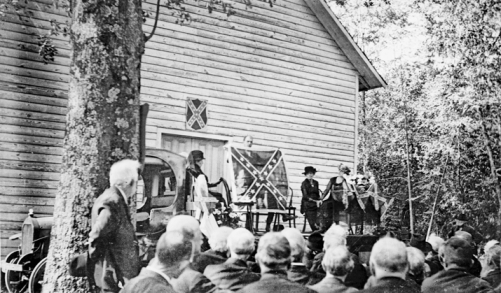See also: The Lost Cause on ANCHOR, Redemption and Redeemers in the South on ANCHOR

Confederate Memorial Day has been observed in North Carolina and throughout the South on different days and under various names since 1866.
In that first year after the close of the Civil War, communities across the South hosted ceremonies at grave sites, on courthouse lawns, and at state capitols. That was the beginning of an annual tradition observed with memorial addresses by dignitaries, band concerts, the laying of wreaths and flowers, picnics, and community meals. In North Carolina, May 10th, the date of the death of Gen. Thomas J. "Stonewall" Jackson, was originally named by the members of the Wake County Ladies' Memorial Association as the day of remembrance.
By the end of the twentieth century, two Confederate Memorial Days had come to be observed in North Carolina. The May 10th date remains the official Confederate Memorial Day in North Carolina. A second memorial is held during the first weekend in May, when the Sons of Confederate Veterans and the Military Order of the Stars and Bars hold their annual conventions. During that weekend, besides the two convening organizations, members of the United Daughters of the Confederacy, the Order of Confederate Rose, the Children of the Confederacy, and other people with ties to the Confederacy attend services at Oakwood Cemetery, at the State Capitol, and elsewhere. Dances, balls, and picnics, are also traditionally held in many towns and communities across the state to observe the day.